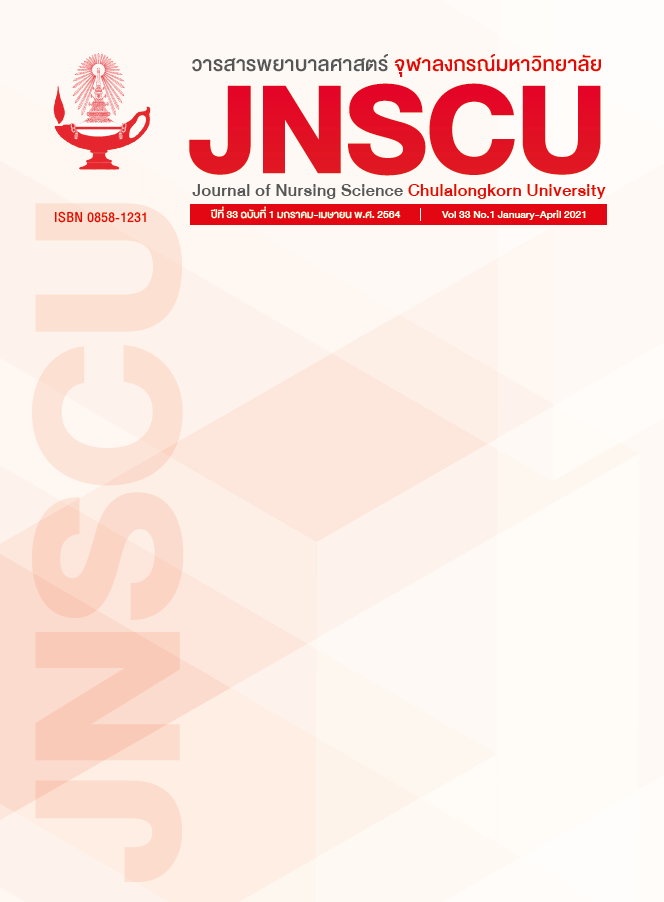ผลของโปรแกรมจัดการการตีตราตนเองต่ออาการซึมเศร้า ในผู้ป่วยเสพติดสารกลุ่มโอปิออยด์
คำสำคัญ:
การจัดการการตีตราตนเอง, อาการซึมเศร้า, ผู้ป่วยเสพติดสารกลุ่มโอปิออยด์บทคัดย่อ
วัตถุประสงค์: 1) เพื่อศึกษาเปรียบเทียบอาการซึมเศร้าในผู้ป่วยเสพติดสารกลุ่มโอปิออยด์ที่ได้รับโปรแกรมจัดการการตีตราตนเองในระยะก่อนการทดลอง หลังการทดลองทันที และหลังการทดลอง 1 เดือน และ 2) เพื่อศึกษาเปรียบเทียบอาการซึมเศร้าในผู้ป่วยเสพติดสารกลุ่มโอปิออยด์ระหว่างกลุ่มที่ได้รับโปรแกรมจัดการการตีตราตนเองกับกลุ่มที่ได้รับการดูแลตามปกติ
แบบแผนการวิจัย: การวิจัยกึ่งทดลอง
วิธีดำเนินการวิจัย: กลุ่มตัวอย่าง คือ ผู้ป่วยเสพติดสารกลุ่มโอปิออยด์ที่มีปัญหาอาการซึมเศร้าและมารับบริการที่คลินิกเมทาโดน สถาบันบำบัดรักษาและฟื้นฟูผู้ติดยาเสพติดแห่งชาติบรมราชชนนี (สบยช.) จำนวน 38 ราย เครื่องมือที่ใช้ คือ โปรแกรมจัดการการตีตราตนเอง แบบสอบถามข้อมูลส่วนบุคคล แบบประเมินโรคซึมเศร้า 9 คำถาม (9Q) ฉบับปรับปรุงภาษากลาง และแบบประเมินการตีตราตนเองสำหรับผู้เสพติดสารกลุ่มโอปิออยด์ ซึ่งได้ผ่านการตรวจสอบความตรงตามเนื้อหาและมีค่าความเที่ยงเท่ากับ .77 และ .79 ตามลำดับ วิเคราะห์ข้อมูลโดยใช้สถิติเชิงบรรยาย การวิเคราะห์ความแปรปรวนแบบวัดซ้ำ และทดสอบค่าเฉลี่ยด้วยวิธี Least Significant Difference
ผลการวิจัย: 1) ค่าเฉลี่ยคะแนนอาการซึมเศร้าของผู้ป่วยเสพติดสารกลุ่มโอปิออยด์กลุ่มที่ได้รับโปรแกรมจัดการการตีตราตนเองเปรียบเทียบ 3 ระยะเวลา ได้แก่ ก่อนการทดลอง หลังการทดลองทันที และหลังการทดลอง 1 เดือน พบว่าไม่มีความแตกต่างกัน และ 2) ค่าเฉลี่ยคะแนนอาการซึมเศร้าของผู้ป่วยเสพติดสารกลุ่มโอปิออยด์กลุ่มที่ได้รับโปรแกรมจัดการการตีตราตนเองในระยะหลังการทดลองทันทีและหลังการทดลอง 1 เดือน ลดลงกว่ากลุ่มที่ได้รับการดูแลตามปกติอย่างมีนัยสำคัญทางสถิติที่ระดับ .05
สรุป: โปรแกรมจัดการการตีตราตนเองมีประสิทธิภาพสามารถลดอาการซึมเศร้าในผู้ป่วยเสพติดสารกลุ่มโอปิออยด์ที่อยู่ระหว่างการบำบัดด้วยเมทาโดนทดแทนได้ในระยะหลังการทดลองทันที
เอกสารอ้างอิง
United Nations Office on Drugs and Crime.
Analysis of drug markets: Opiates,
cocaine, cannabis, synthetic drugs.
Austria: United Nations; 2018.
Degenhardt L, Peacock A, Colledge S, Leung
J, Grebely J, Vickerman P, et al. Global
prevalence of injecting drug use and
sociodemographic characteristics and
prevalence of HIV, HBV, and HCV in
people who inject drugs: a multistage
systematic review. Lancet Glob Health
; 5(12): e1192-e207.
Heimer R, Barbour R, Palacios WR, Nichols LG,
Grau LE. Associations between injection
risk and community disadvantage
among suburban injection drug users in
southwestern Connecticut, USA. AIDS
Behav 2014; 18(3): 452-63.
Armstrong G, Nuken A, Samson L, Singh S,
Jorm AF, Kermode M. Quality of life,
depression, anxiety and suicidal ideation
among men who inject drugs in Delhi,
India. BMC Psychiatry 2013; 13(151):
-35.
Williams SC, Davey-Rothwell MA, Tobin KE,
Latkin CA. People who inject drugs and
have mood disorders–a brief assessment
of health risk behaviors. Subst 2017;
(9): 1175-84.
Li L, Tuan NA, Liang L-J, Lin C, Farmer SC,
Flore M. Mental health and family
relations among people who inject
drugs and their family members in
Vietnam. Int J Drug Policy 2013; 24(6):
-9.
Yang LH, Grivel MM, Anderson B, Bailey GL,
Opler M, Wong LY, et al. A new brief
opioid stigma scale to assess perceived
public attitudes and internalized stigma:
Evidence for construct validity. J Subst
Abuse Treat 2019; 99: 44-51.
Luoma JB, Kohlenberg BS, Hayes SC,
Bunting K, Rye AK. Reducing self-stigma
in substance abuse through acceptance
and commitment therapy: Model,
manual development, and pilot
outcomes. Addict Res Theory 2008;
(2): 149-65.
Smith LR, Earnshaw VA, Copenhaver MM,
Cunningham CO. Substance Use Stigma:
Reliability and validity of a theory-based
scale for substance-using populations.
Drug Alcohol Depend 2016; 162: 34-43.
Hayes SC, Luoma JB, Bond FW, Masuda A,
Lillis J. Acceptance and Commitment
Therapy: Model, processes and
outcomes. Behav Res Ther 2006; 44(1):
-25.
Haenjohn J. Acceptance and commitment
therapy. Chonburi: get good creation
company limited; 2018.
Yalom ID. The theory and practice of group
psychotherapy. 4th ed. New York: Basic
Books; 1995.
Kongsuk T, Arunpongpaisal S, Janthong S,
Prukkanone B, Sukhawaha S,
Leejongpermpoon J. Criterion-related
validity of the 9 questions depression
rating scale revised for Thai Central
Dialect. J Psychiatr Assoc Thailand 2018;
(4): 321-34. (in Thai)
Saedy M, Kooshki S, Firouzabadi MJ,
Emamipour S, Ardani AR. Effectiveness
of acceptance-commitment therapy on
anxiety and depression among patients
on methadone treatment: A Pilot Study.
Iran J Psychiatry Behav Sci 2015; 9(1):
e222. Doi: 10.17795/ijpbs222
Bohlmeijer ET, Fledderus M, Rokx TAJJ,
Pieterse ME. Efficacy of an early
intervention based on acceptance and
commitment therapy for adults with
depressive symptomatology: Evaluation
in a randomized controlled trial. Behav
Res Ther 2011; 49(1): 62-7.
Hiller SP, Syvertsen JL, Lozada R, Ojeda VD.
Social support and recovery among
Mexican female sex workers who inject
drugs. J Subst Abuse Treat 2013; 45(1):
-54.
Li J, Gu J, Lau JTF, Chen H, Mo PKH, Tang
M. Prevalence of depressive symptoms
and associated factors among people
who inject drugs in China. Drug Alcohol
Depend 2015; 151: 228-35.
ดาวน์โหลด
เผยแพร่แล้ว
ฉบับ
ประเภทบทความ
สัญญาอนุญาต

อนุญาตภายใต้เงื่อนไข Creative Commons Attribution-NonCommercial-NoDerivatives 4.0 International License.
##default.contextSettings.thaijo.licenseTerms##


